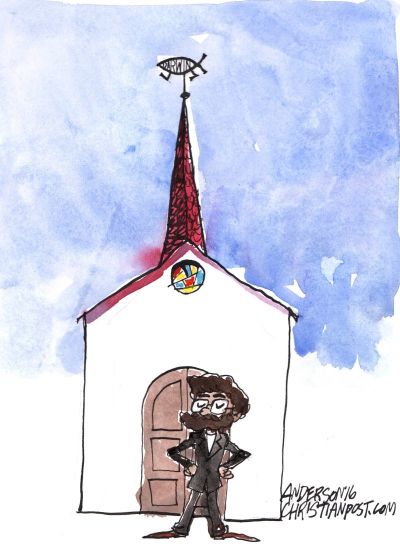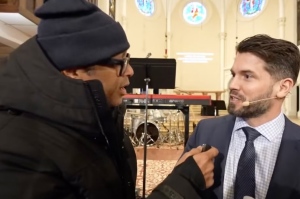The problem of Christians becoming atheists

A central goal of Christian apologetics is to persuade people to become and remain Christians. But what happens when that persuasion fails? In particular, what can we learn from those instances of failure when Christians reject the faith altogether?
In this conversation, I speak with Dr. John Marriott about the topic of Christians deconverting and becoming atheists … and what we can do about it. Needless to say, this is a hugely important topic, especially for anybody interested in apologetics, evangelism, or discipleship, and Dr. Marriott is ideally suited to address it. He is currently an adjunct professor in Philosophy and Intercultural Studies at Biola University and author of A Recipe for Disaster: How Parents and Churches Prepare Individuals to Lose Their Faith, And How They Can Instill a Faith That Endures (Wipf and Stock, 2018). You can learn more about Dr. Marriott online at https://www.johnmarriott.org/.
We cover a lot of ground in our conversation, and for that reason, I’ve divided our exchange into two articles. This article addresses the problem while the sequel will turn to address the solutions.
RR: John, thanks for joining us. Your major area of research has been focused on deconversion, specifically from Christianity to atheism. What is it that drew you to this topic?
JM: Thanks for having me. I think the short answer to that question is that in the midst of my doctoral program I stumbled across a website for former Christians. I was both intrigued and shocked at the number of former believers who had posted their deconversion stories. And not just nominal folks. There were former pastors, missionaries, worship leaders and seminary grads. It was troubling to say the least. So, I began looking into deconversion and what I found was captivating. The number of people who once identified as believers but no longer do is increasing at record numbers and record rates. I wanted to find out why? What did they know that I didn’t?
RR: That prompts several questions in my mind. But to begin with, could you say more about those record numbers? What kind of numbers are we talking about?
JM: Those are good questions. It’s always hard to determine exact numbers. And we all know that you can get statistics to say just about anything you want. But in the case of faith exit, it really does seem to be the case that people are leaving the faith in droves.
For example, In 2001, the Southern Baptist Convention reported they are losing between 70 and 88 percent of their youth after their freshman year in college. Of SBC teenagers involved in church youth groups, 70 percent stopped attending church within two years of their high school graduation. The following year, the Southern Baptist Council on Family Life also reported that 88 percent of children in evangelical [Baptist] homes leave church by the age of eighteen. The Barna Group announced in 2006 that 61 percent of young adults who were involved in church during their teen years were now spiritually disengaged.
Supporting Barna’s findings, a 2007 Assemblies of God study reported that between 50 percent and 67 percent of Assemblies of God young people who attend a non-Christian public or private university will have left the faith four years after entering college. A similar study from LifeWay Research that came out the same year claimed that 70 percent of students lose their faith in college, and of those only 35 percent eventually return. In May 2009, Robert Putnam and David Campbell presented research from their book American Grace: How Religion Divides and Unites Us, to the Pew Forum study on “Religion and Public Life,” in which they claimed that young Americans are leaving religion at five to six times the historic rate. They also noted that the percentage of young Americans who identify as having no religion is between 30 and 40 percent, up from between 5 and 10 percent only a generation ago.
That same year, the Fuller Youth Institute’s study “The College Transition Project” discovered that current data seems “to suggest that about 40 to 50 percent of students in youth groups struggle to retain their faith after graduation. The 2010 UCLA study “Spirituality in Higher Education” found that only 29 percent of college students regularly attended church after their junior year, down from 52 percent the year before they entered college. A second UCLA study, “The College Student Survey,” asked students to indicate their present religious commitment. Researchers then compared the responses of freshmen who checked the “born again” category with the answers they gave four years later when they were seniors. What they found was shocking. On some campuses as high as 59 percent of students no longer described themselves as “born again.”
Given what we know regarding the loss of faith among American young people, it will come as no surprise that America’s Class of 2018 cares less about their religious identity than any previous college freshman class in the last forty years. A third study by UCLA found that students across the U.S. are disassociating themselves from religion in record numbers. “The American Freshman” study reveals that nearly 28 percent of the 2014 incoming college freshman do not identify with any religious faith. That is a sharp increase from 1971 when only 16 percent of freshman said they did not identify with a specific religion.
RR: Whoa, thanks for that helpful, if depressing, survey. So how widespread is the problem, geographically speaking?
JM: The focus of my research was on the United States. I have since broadened it to include Canada as well. Although I cannot prove it, I suspect that what we are seeing in the U.S. and Canada regarding the loss of faith is similar to the secularization process that has taken place in Europe. Although the prediction of Secularization Theory (as societies become more modern they will become less religious) has not been fulfilled on a global scale, it most definitely has proven to be true in the case of Europe. Canada is clearly following in Europe’s footsteps, and I suspect given enough time we will see a similar state of affairs in the United States.
RR: What are most of these people becoming when they deconvert? Do most become atheists? Or are many becoming “spiritual but not religious” nones?
JM: When individuals leave their Christian faith they have a number of new identities to choose from. They either become atheists, agnostics, “nones” or “spiritual but not religious.” The “nones” are not necessarily atheists. They may still believe in God but no longer identify with any kind of religious group. The “spiritual but not religious” folks are similar to the “nones” but they are more likely to be involved in spiritual exploration. It is hard to know how many former Christians are “nones” and “spiritual but not religious” and how many are atheists. Either way, there are large numbers of folks no longer identifying as Christians. My interest is in those individuals who were once committed Christians of an evangelical sort, that now identify as atheists. And by atheist I mean they no longer believe in God. They may either deny his existence or simply no longer affirm it.
RR: Thanks, that’s very helpful. So keeping in mind that we can only scratch the surface here, how about we proceed by first addressing a diagnosis and then a solution? With that in mind, what are some of the major factors you see behind this precipitous decline in the faithful?
JM: I think there are at least three factors. The first is mistaking a particular take or interpretation of Christianity for Christianity itself. This becomes problematic when the take or interpretation that is assumed to be Christianity elevates an excessive number of doctrines and practices to the level of the non-negotiable. This produces a house of cards faith. If an individual comes to reject any one of those doctrines or practices, the entire edifice will collapse.
RR: Like what?
JM: For example, a common refrain among the deconverted is that they were told that the creation account had to be a literal 6 day, 24-hour period of time. If not, the rest of the Bible had no foundation and thus no justification for it’s claim that we are sinners in need of a savior. When, for various reasons, they came to the conclusion that the universe was billions of years old they felt that they could no longer be Christians. For them, being a Christian meant “believing in literal 6 day creation”. In rejecting the young-earth view they assumed they were rejecting Christianity. In reality they were only rejecting a doctrinally bloated take on Christianity they mistook for the real thing.
RR: I couldn’t agree more. I regularly encounter people who left the church because of particular beliefs or practices that are far from what I would call mere Christianity. Young earth creationism is a great example, but there definitely are many others: everything from hell as eternal conscious torment to the idea that good Christians vote Republican.
So what’s next?
JM: The second factor is unmet expectations. When God and / or the Bible doesn’t live up to what deconverts expect a crisis of faith results. The problem, of course, is not God or the Bible but what many deconverts were taught to expect from the God or the Bible. One of the most common expectations that deconverts have is that the Bible is completely error free. And not just that it is inerrant but that it must be inerrant or else it cannot be the word of God. Somewhere along the way they were told that in order for the Bible to be the word of God it had to be free of error. Furthermore, the discovery of even one error would prove it wasn’t the inspired word of God. Eventually, they encountered what they believed was an error in the Bible. And, given what they assumed about the Bible, they were forced to conclude the Bible wasn’t God’s word. Rather than question the assumption of inerrancy, they took the more drastic action of concluding Christianity was a sham. The unquestioned assumption that the Bible is, and has to be inerrant, or else it cannot be the word of God, is the number one assumption / expectation that appears in deconversion narratives.
RR: Bart Ehrman is a great example. In his bestseller Misquoting Jesus he recounts how after studying at Wheaton College as an evangelical inerrantist, he came to study at Princeton. In one of his papers he focused on developing a long, convoluted argument that Jesus did not make a mistake in Mark 2 when identifying the priest during the time that King David ate bread from the temple. His prof responded to that long, convoluted argument with a simple observation: “Maybe Mark just made a mistake.” (Misquoting Jesus, 9)
Ehrman was initially very disturbed at this undeniably simple explanation. But eventually, he found himself considering that it was likely true: maybe Mark did just make a mistake. He then observes, “Once I made that admission, the floodgates opened. For if there could be one little, picayune mistake in Mark 2, maybe there could be mistakes in other places as well.” (9)
In Ehrman’s case, it’s easy to see how a particular understanding of inerrancy helped send his faith right onto the rocks of agnosticism.
So what’s the third example?
JM: Yes, Bart is a good example. In fact I tell his story in the book. It’s clear that he not only had misguided assumptions and expectations about the Bible, but also of God. When God did not live up to what his expectations he became disillusioned. The one-two punch of unmet expectations concerning the Bible and God can be fatal to faith.
The third factor is that we have not done a good job of communicating the content of the faith in what Charles Taylor calls “A Secular Age”. Taylor, as you know, argues that the conditions for what is believable in the modern West have radically changed. No longer is belief in God, or the truth of Christianity the default position in our culture. To the contrary, affirming even bare theism is difficult for educated, reflective, culturally aware folks. And believing in the God of the Bible can be downright embarrassing.
How, former Christians ask, can an intelligent, educated person accept the biblical story of two naked people, a talking snake and a magical tree, at face value given the world we live in? Or that a man lived inside a fish for three days, people lived over 900 years, and the dead come back to life?
What such questions reveal is that although deconvert’s understanding of reality became more nuanced, and sophisticated, as they aged and became more educated, their biblical understanding stayed at a simplistic, Sunday school level. Ultimately, they could not bridge the gap between having a “university” understanding of reality with their Sunday school concept of the contents of the Bible. For many former Christians, the “Old, Old, Story” sounded more like an ancient fairy tale than it did sober history. Believing in fairy tales is embarrassing. Children, not adults believe fairy tales, and no one wants to be considered an intellectual child.
RR: Well said. I like to say that we live in the age of the flying spaghetti monster, that is, an age in which Christian beliefs are viewed by many in the wider culture as arbitrary, absurd, and infantile. And when you grow up within a Christian subculture where your beliefs are rarely if challenged, it can be a real shock to the system when you first encounter the deep skepticism of many in the wider culture. It becomes even worse when you discover that many of those people are articulate and thoughtful and appear to have good reasons for what they believe.
Stay tuned for part 2 of our conversation, “The Solution to Christians Becoming Atheists.” And for a far more in-depth exploration of these issues, be sure to check out John Marriott’s new book, A Recipe for Disaster: Four Ways Churches and Parents Prepare Individuals to Lose Their Faith and How They Can Instill a Faith That Endures.
Dr. Randal Rauser is Professor of Historical Theology at Taylor Seminary in Edmonton, Alberta, where he has taught since 2003. He blogs at randalrauser.com and lectures widely on issues of theology, Christian worldview, and apologetics. Randal is the author of many books including his latest, What's So Confusing About Grace?



























